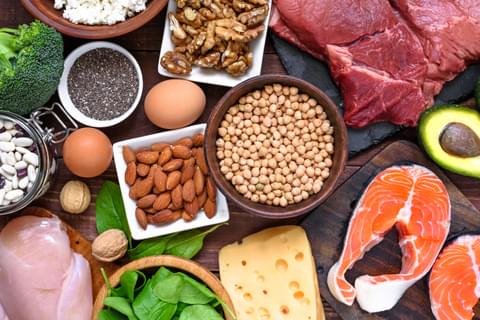

Ingredient Innovation Leading the Food Industry in 2025
As we enter 2025, the food ingredients industry stands at the forefront of transformative innovation. Ingredient development is driving the evolution of consumer products, with trends focused on health, sustainability, and exceptional sensory experiences. Here’s how ingredient innovation is set to shape the future of the food industry this year.

Plant-Based Foods Reach New Heights
The plant-based movement continues to thrive, with 2025 poised to deliver breakthroughs in alternative proteins. Manufacturers are expanding beyond soy and pea to explore innovative sources like chickpea, fava bean, and algae. The focus is on achieving superior taste, texture, and functionality to rival animal-based foods. Enzymes and precision fermentation are key tools, enabling manufacturers to enhance protein quality, create rich umami flavours, and deliver authentic mouthfeel.
Clean Label Solutions Redefined
Clean-label innovation is transforming ingredient lists. Natural flavour enhancers, plant-based emulsifiers, and sustainable preservatives are gaining traction, allowing manufacturers to meet growing consumer demand for transparency. Traceability technologies, such as blockchain, are adding value by ensuring ethical sourcing and fostering consumer trust.
Functional Ingredients Take the Spotlight
The health and wellness trend continues to drive the demand for functional ingredients. Probiotics, prebiotics, plant-based omega-3s, and adaptogens are leading developments, targeting benefits like immunity, gut health, and mental wellness. Ingredient innovation is helping manufacturers incorporate these bioactives seamlessly into everyday foods and beverages.
Sustainability Through Ingredient Innovation
Sustainability is at the heart of ingredient innovation in 2025. Upcycled ingredients, such as fruit fibres and protein-rich by-products, are becoming mainstream, supporting circular economy practices. Regenerative agriculture and plant-based packaging solutions further emphasise the industry's commitment to reducing environmental impact.
Sensory Excellence Through Advanced Ingredients
Taste and texture remain pivotal to consumer acceptance, and ingredient advancements are raising the bar. Natural umami boosters, aroma compounds, and texture enhancers are creating products with rich, authentic sensory profiles. For plant-based foods, innovative processing techniques like enzymatic hydrolysis are overcoming the challenge of replicating animal-like textures.
Fermentation as a Catalyst for Change
Fermentation is revolutionising the ingredient landscape. Precision fermentation is enabling the creation of novel proteins, bioactives, and probiotics, while traditional fermentation continues to enhance flavours and textures. This dual approach offers unparalleled versatility and innovation in the food ingredient space.
Technology-Driven Ingredient Discovery
Technology is accelerating ingredient development. AI and machine learning are unlocking new formulations and ingredients faster than ever, while digital tools are helping manufacturers predict and adapt to consumer trends. These advancements are ensuring that ingredient innovation keeps pace with market demands.
Global Flavours Inspire Innovation
Ingredients inspired by regional and global cuisines are capturing consumer interest. Middle Eastern spices, Asian fermented flavours, and innovative blends of traditional and modern ingredients are redefining flavour profiles, adding authenticity and excitement to product offerings.
The Future of Ingredient Innovation
2025 is shaping up to be a pivotal year for ingredient innovation, with sustainability, functionality, and sensory excellence driving progress. As these trends unfold, the food industry is well-positioned to meet evolving consumer needs and deliver transformative products.
At Biocatalysts Ltd, we’re excited to play a role in this evolution, offering unique enzyme solutions that empower manufacturers to innovate and excel. Together, let’s shape the future of food through exceptional ingredient innovation.

